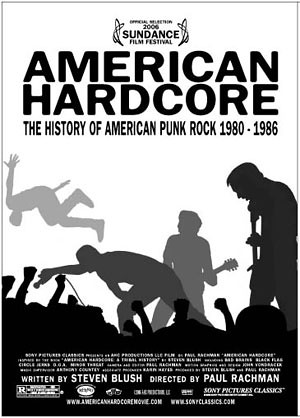 Next time you go into a movie theater, turn to your neighbor and have him or her punch you in the face- repeatedly. This is similar to what Paul Rachman, director of American Hardcore, was trying to do in his movie. Some times he succeeds, with the movie coming out of the screen at you like a brick, but at other times it just fizzles. On a whole, however, it is quite an entertaining documentary. If you know nothing about punk, it's very informative, but if you know lots about punk, you may be a little disappointed.
Next time you go into a movie theater, turn to your neighbor and have him or her punch you in the face- repeatedly. This is similar to what Paul Rachman, director of American Hardcore, was trying to do in his movie. Some times he succeeds, with the movie coming out of the screen at you like a brick, but at other times it just fizzles. On a whole, however, it is quite an entertaining documentary. If you know nothing about punk, it's very informative, but if you know lots about punk, you may be a little disappointed.The movie, for all intensive purposes, spans six year- 1980-1986, and how punk evolved during that time. It starts out very interesting showing the roots of hardcore punk in LA and San Francisco, and how it spread throughout the country to DC, then up the coast to Boston and New York, then finally merging in the middle in the heartland- just in time for the movement to putter out. For the most part, the interviews, footage, and very well done animatics, follow a natural progression, and lead the story along. Like punk itself, though, chronology seems to get confusing at times. This is an understandable problem, however, as every group claims to be the originators.
In what seems to be a blossoming technique in documentaries, there was no narrator. Everything was presented by those who lived it, and I love this idea. It works much better than having a deep voiced narrator reading lines about a story they have no involvement in (unless that narrator happens to be Morgan Freeman). The central focus of the movie is, of course, the bands. There are dozens of people interviewed, and discussed. The main stars however, are Henry Rollins (who provides a vast majority, and perhaps the most coherent of the information), Ian MacKaye, Keith Morris, and Paul 'H.H' Hudson. They all give interesting testimony, and paint what is probably the most accurate story of what really happened in the movement.
Of course no rockumentary is complete without concert footage, and American Hardcore is no exception. Life footage is frequent, but the movie isn't inundated with it. One of my biggest complaints is when a documentary is nothing more than a collection of mediocre concert footage. If this is what I want to watch, I'll just rent one of the thousands of concert DVDs. Like punk itself, the footage in this movie is fast, short, and frequent. And usually, there is someone talking over it and the footage is used to *gasp* illustrate a point their making.
I will say, however, that this movie is not flawless. There are times when it drags (perhaps ten scenes with S.O.D talking about their feud with the CroMags was a little needless). The movie barely tops the hour and a half mark, but still seems like it could have used some trimming. A documentary like this, to really get the point across, can never let up on its intensity. I would have been happy with a shorter, more bombastic movie- which goes against how I normally feel. American Hardcore, however, is an exception.
Also, there were some suspicious absences. Most notably the Dead Kennedies and the Misfits were missing. Even to those that know very little about punk (myself), the Dead Kennedies are one of the most influential bands of the era. I am honestly curious how they were included nowhere in the movie. Especially when Moby even makes an appearance claiming to be the original lead singer of FEAR. At least Minor Threat, Bad Brains, Black Flag all were very present.
The film winds down with everyone discussing what happened at the end. Why did the movement come to an almost sudden halt in 1986. Henry Rollins refers to the moment Dez Cardena called him and told him he was quitting Black Flag. Ian MacKaye blames the violence, saying it started overshadowing the movement. Many others cited Bad Brains turning to reggae. Certainly these claims are all to be taken with a grain of salt, but they're interesting none-the-less.
The finale is perhaps the best, yet least documentary part. In interviews with the stars of the movie, it has them taking shots at punk today. Rollins compares his living off candy bars from gas stations to the bands today touring by airplane. There's something strangely satisfying hearing these pioneers of punk say that "punk is dead." Whether it's true or not, after seeing this movie, I'm kind of inclined to believe them.
4/5
No comments:
Post a Comment